History
The prize was established in 1975 by the Ministry of Culture of Spain and first awarded the following year. [1] The Encyclopædia Britannica calls it "most prestigious and remunerative award given for Spanish-language literature". [1] The winner receives a monetary award of 125,000 euros, which makes it one of the richest literary prizes in the world. [2] The prize rewards authors from any Spanish-speaking nation and recognizes the recipient's overall body of work. [1] Of the forty-seven prizes awarded in the history of the Cervantes Prize, only six have ever been awarded to women. In 1988, the Spanish writer María Zambrano (1904-1991) was the first female writer to be honored. The award is named after Miguel de Cervantes, author of Don Quixote . [2] The candidates are proposed by the Association of Spanish Language Academies (i.e., the Royal Spanish Academy). [3]
As of the presentation of the 2023 award to Luis Mateo Díez, the recipients have been recognized for their writing of novels, poetry, short stories, essays, translations, philosophy or dramas –or for combinations thereof. With two winners in 1979, there have been 49 recipients of the Miguel de Cervantes Prize.
The Cervantes Prize and the Nobel Prize in Literature
Three of the 45 winners of the Miguel de Cervantes Prize have also won the Nobel Prize in Literature. Octavio Paz (Cervantes 1981, Nobel 1990) and Mario Vargas Llosa (Cervantes 1994, Nobel 2010), were awarded the Nobel Prize in subsequent years, while Camilo José Cela received the Nobel Prize in 1989 and was awarded the Cervantes Prize in 1995.
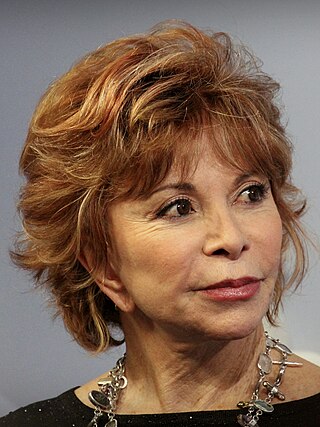
Isabel Angélica Allende Llona is a Chilean writer. Allende, whose works sometimes contain aspects of the genre magical realism, is known for novels such as The House of the Spirits and City of the Beasts, which have been commercially successful. Allende has been called "the world's most widely read Spanish-language author." In 2004, Allende was inducted into the American Academy of Arts and Letters, and in 2010, she received Chile's National Literature Prize. President Barack Obama awarded her the 2014 Presidential Medal of Freedom.

Jorge Mario Pedro Vargas Llosa, 1st Marquess of Vargas Llosa, more commonly known as Mario Vargas Llosa, is a Peruvian novelist, journalist, essayist and former politician, who also holds citizenship of Spain and the Dominican Republic. Vargas Llosa is one of Latin America's most significant novelists and essayists and one of the leading writers of his generation. Some critics consider him to have had a larger international impact and worldwide audience than any other writer of the Latin American Boom. In 2010, he won the Nobel Prize in Literature, "for his cartography of structures of power and his trenchant images of the individual's resistance, revolt, and defeat." He also won the 1967 Rómulo Gallegos Prize, the 1986 Prince of Asturias Award, the 1994 Miguel de Cervantes Prize, the 1995 Jerusalem Prize, the 2012 Carlos Fuentes International Prize, and the 2018 Pablo Neruda Order of Artistic and Cultural Merit. In 2021, he was elected to the Académie française.
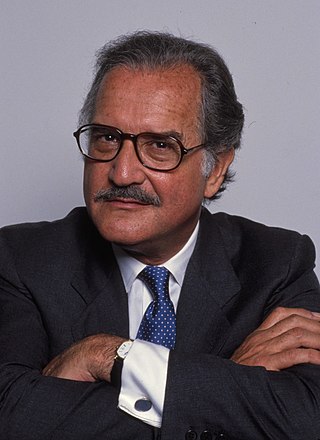
Carlos Fuentes Macías was a Mexican novelist and essayist. Among his works are The Death of Artemio Cruz (1962), Aura (1962), Terra Nostra (1975), The Old Gringo (1985) and Christopher Unborn (1987). In his obituary, The New York Times described Fuentes as "one of the most admired writers in the Spanish-speaking world" and an important influence on the Latin American Boom, the "explosion of Latin American literature in the 1960s and '70s", while The Guardian called him "Mexico's most celebrated novelist". His many literary honors include the Miguel de Cervantes Prize as well as Mexico's highest award, the Belisario Domínguez Medal of Honor (1999). He was often named as a likely candidate for the Nobel Prize in Literature, though he never won.
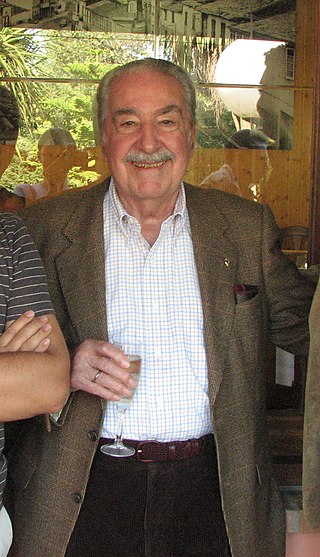
Álvaro Mutis Jaramillo was a Colombian poet, novelist, and essayist. His best-known work is the novel sequence The Adventures and Misadventures of Maqroll, which revolves around the character of Maqroll el Gaviero. He won the 1991 International Nonino Prize in Italy. He was awarded the 2001 Miguel de Cervantes Prize and the 2002 Neustadt International Prize for Literature.

Dulce María Loynaz Muñoz was a Cuban poet, and is considered one of the principal figures of Cuban literature. She was awarded the Miguel de Cervantes Prize in 1992. She earned her Doctorate in Civil Law at University of Havana in 1927.

Miguel Delibes SetiénMML was a Spanish novelist, journalist and newspaper editor associated with the Generation of '36 movement. From 1975 until his death, he was a member of the Royal Spanish Academy, where he occupied letter "e" seat. Educated in commerce, he began his career as a cartoonist and columnist. He later became the editor for the regional newspaper El Norte de Castilla before gradually devoting himself exclusively to writing novels.

Edith Marion Grossman was an American literary translator. Known for her work translating Latin American and Spanish literature to English, she translated the works of Nobel laureate Mario Vargas Llosa, Nobel laureate Gabriel García Márquez, Mayra Montero, Augusto Monterroso, Jaime Manrique, Julián Ríos, Álvaro Mutis, and Miguel de Cervantes. She was a recipient of the PEN/Ralph Manheim Medal for Translation and the 2022 Thornton Wilder Prize for Translation.
A literary award or literary prize is an award presented in recognition of a particularly lauded literary piece or body of work. It is normally presented to an author.
Latin American literature consists of the oral and written literature of Latin America in several languages, particularly in Spanish, Portuguese, and the indigenous languages of the Americas. It rose to particular prominence globally during the second half of the 20th century, largely due to the international success of the style known as magical realism. As such, the region's literature is often associated solely with this style, with the 20th century literary movement known as Latin American Boom, and with its most famous exponent, Gabriel García Márquez. Latin American literature has a rich and complex tradition of literary production that dates back many centuries.
The Miguel Ángel Asturias National Prize in Literature is the most important literary award in Guatemala. Sometimes referred to as the "National Literary Prize", it is dedicated to the memory of the Guatemalan writer, statesman, and Nobel Prize winner Miguel Ángel Asturias and is a one-time only award that recognizes an individual writer's body of work.

The Casa de las Américas Prize is a literary award given by the Cuban Casa de las Américas. Established in 1959, it is one of Latin America’s oldest and most prestigious literary prizes.

The Nobel Prize in Literature is a Swedish literature prize that is awarded annually, since 1901, to an author from any country who has, in the words of the will of Swedish industrialist Alfred Nobel, "in the field of literature, produced the most outstanding work in an idealistic direction". Though individual works are sometimes cited as being particularly noteworthy, the award is based on an author's body of work as a whole. The Swedish Academy decides who, if anyone, will receive the prize. The academy announces the name of the laureate in early October. It is one of the five Nobel Prizes established by the will of Alfred Nobel in 1895. Literature is traditionally the final award presented at the Nobel Prize ceremony. On some occasions, the award has been postponed to the following year, most recently in 2018 as of July 2023.
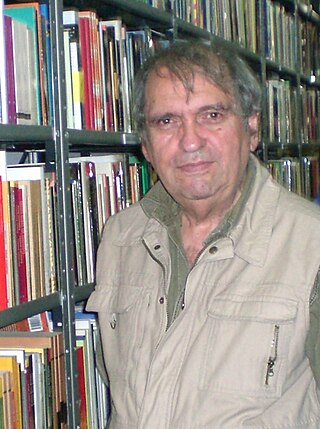
Rafael Cadenas is a Venezuelan poet and essayist.
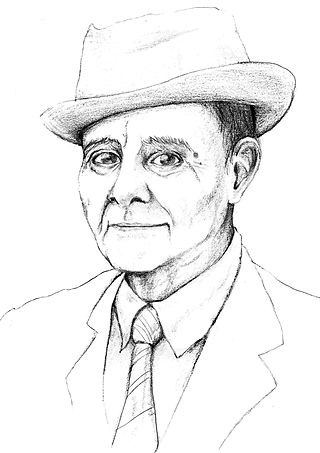
The Premio Nacional de las Letras Españolas or National Prize for Spanish Literature is one of several National Prizes awarded by the Spanish Ministry of Culture. First awarded in 1984, it recognises an author's literary career. The prize is 40,000 euros.

The 2010 Nobel Prize in Literature was awarded the Peruvian writer Mario Vargas Llosa "for his cartography of structures of power and his trenchant images of the individual's resistance, revolt, and defeat." The prize was announced by the Swedish Academy on 7 October 2010. He is the first Nobel laureate in Literature from Peru and the fifth Latin American to become one after 1982 Colombian laureate Gabriel García Márquez and 1971 Chilean laureate Pablo Neruda.

The 2006 Nobel Prize in Literature was awarded to the Turkish writer Orhan Pamuk "who in the quest for the melancholic soul of his native city has discovered new symbols for the clash and interlacing of cultures."

The 1907 Nobel Prize in Literature was awarded to the British writer Rudyard Kipling (1865–1936) "in consideration of the power of observation, originality of imagination, virility of ideas and remarkable talent for narration which characterize the creations of this world-famous author." He is the first English-language writer to receive the prize, and being aged 41, is its youngest recipient to date.



























































